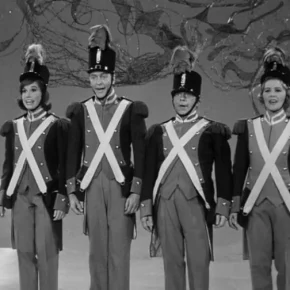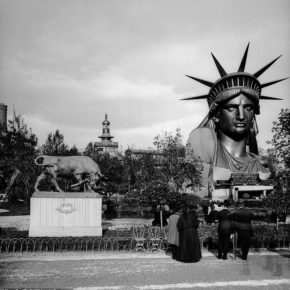On today’s Kojo Nnamdi Show, Tom Sherwood called the University of the District of Columbia (UDC) a “backwater school.” This didn’t go over well with some of DC’s old guard politicos. One of them, Eugene Kinlow, demanded (via Twitter) that Sherwood apologize and then said the following:
“Educating people who might be the first in their families to attend college, creating a college based on open access and lifelong learning, a highly regarded low cost law school and creating a community college is taking up the rear? Typical DC Elitist!”
But Tom Sherwood is right: UDC is an institution that has no clear purpose and should be re-evaluated as to its mission and goals.
UDC has three core elements: a traditional four-year undergraduate school, a law school, and a two-year community college. All of these schools are available at low cost to DC residents, which appears to be a benefit to those most in need of financial assistance. They also give a very “state-like” look-and-feel to the District, which longs to be more than “the last colony” in the United States.
Yet to my eye, of all these schools only one should continue: the community college.
Why? Let me explain:
First things first: college education is not a right. Access to the education is a right, but receiving a college education isn’t. College – and in this case I mean an accredited, four-year degree-granting institution – shouldn’t be a given simply because a student has met the minimum requirements of graduation from high school. The sense that college is a right is a byproduct of the so-called “generation of entitlement” – the same movement that always asks “what about me?,” creates grade inflation throughout the educational system, and causes folks to look down on available, if not exciting, jobs because they are “below my station.”
But college is never a given, and not everybody should go into a four-year college – or even any college – if college won’t help them or is too academically challenging.
But for those who are college material, DC isn’t hurting for opportunity, nor are DC residents without affordable options without counting UDC as one of said options.
The District is home to many well-regarded and accredited undergratuate institutions. Within DC’s boundaries, Georgetown University, The George Washington University, American University, Howard University, Catholic University and Trinity University all offer Bachelor’s degrees that are held in high regard. Spread your reach a bit outside of DC and Johns Hopkins University (Baltimore), University of Maryland (College Park), George Mason University (Fairfax), The United States Naval Academy (Annapolis), and Marymount University (Arlington) all provide well-regarded undergraduate education with full accreditation of their programs.
The same can’t be said for UDC. While certain programs receive accreditation, the whole school has had a tenuous relationship with such status over its history. And like much of the District’s public education system, a lot of money is poured into UDC without much in the way of positive results.
As for UDC’s law school, while I admire its affordability, law school degrees often carry more weight and perceived legitimacy depending on the reputation of the school. And in a town where Georgetown, GWU and American University all feature highly-respected law programs, UDC’s program pales by comparison in terms of reputation.
Why talk of reputation? Because in the real, cutthroat world of business, reputation matters. And in DC and the surrounding area, where connections are the secret gold, attending a school with a top-notch reputation makes a big difference. School with good reputations have alumni networks that open doors. Yes, it’s unfair, but it’s a real-world concern in many fields.*
And when it comes to both four-year undergraduate education and law school, UDC’s reputation is anything but stellar. As mentioned earlier, the undergraduate program dodges the accreditation bullet time and again, which hurts the school’s reputation both within the DC area and, especially, in the national and international realm. And the law school, while a bargain and somewhat well regarded in certain legal circles, still doesn’t have the reputation – and thus the connection possibilities – of its fellow DC-area schools, not to mention law schools across the U.S.
But UDC’s supporters continue to beat the drum of affordability, which is a legitimate concern in a city where many college-eligible students are discouraged by soaring tuition and fees.
A fact that a lot of UDC’s boosters fail to mention is that DC residents, with few exceptions, qualify for in-state tuition reciprocity at four-year state colleges and universities throughout the United States. So if affordability is bandied about as an barrier to access, it shouldn’t be: the University of Maryland is one of these reciprocity-granting schools, and it is on Metrorail’s green line, which is about as accessible as can be. And getting in-state tuition at heavy-hitting schools like the University of Illinois, Penn State, University of Massachusetts, Arizona State University and the like is nothing to scoff at!
Furthermore, financial assistance – in the form of scholarships, grants, fellowships, student loans and the like – is available to almost all college students, especially those with the greatest financial burden. Some schools are even “need-blind” in terms of admissions: if accepted to one of these schools, the school will fund the tuition that the student’s family can’t afford without question.
So if DC student does well in high school, earning good grades in tough courses, opportunity is there, even without UDC entering the picture.
And what of UDC’s mission, then? What of the students, as Kinlow mentions, who may be the first in their family to attend college? Or of the students who otherwise couldn’t get access to college because of academic disadvantage?
This is where UDC does have a single, important mission: creating and running an excellent community college. Community colleges are an essential stepping stone for entry into competitive four-year colleges and universities for students who may not have excelled in high school, those who dropped out and then received a GED, or those who aren’t yet ready to commit to the challenge of a four-year program. Community colleges focus on core curricula, and receiving and Associate’s degree (especially one with excellent grades) from an accredited community college usually leads directly to enrollment and, eventually, completion of a four-year program. Most often, the core curriculum represented by the Associate’s degree counts toward the first two years of core curriculum work at four-year institutions. Furthermore, most of the top-tier four-year institutions (including heavyweights like Williams and Amherst Colleges, perennial top-10 schools in the US News rankings) primarily accept transfers from community colleges.
If UDC were to be reorganized into a leading two-year community college, helping elevate students into four-year degree programs, providing vocational education for those who need a leg up to get into certain fields, and offering DC’s students the chance to become competitive in the world of higher education, they would realize this core part of their mission in ways more far-reaching than now:
“[to] prepare students for immediate entry into the workforce, the next level of education, specialized employment opportunities and life-long learning.
A District of Columbia Community College that is truly a leader in two-year colleges would serve as an ideal model for other cities: providing its students the tools and knowledge to excel throughout life, whether its looking toward a more advanced level of education or simply building a solid academic base upon which to build a better life. Having a highly-regarded, solidly accredited two-year college trumps the current, under-performing reality that is today’s UDC.
So jettison the four-year undergraduate program and reconsider the law school, instead focusing DC’s tax dollars on a top-notch community college. That is the gateway to opportunity for the people of DC. And for DC residents who want a four-year education off the bat: take advantage of the financial resources available, throw yourself into the application, reach for the stars.
But if the current UDC model is perpetuated, the District’s land-grant university will remain, as Sherwood suggests, at the bottom of a very deep stack of institutions of higher education. It’s not typical DC elitism, Eugene – it’s the hard truth.
* – I attended a school – Connecticut College – that is very often confused with a larger state university that is well known for its championship basketball teams, and while many people recognize the quality of the college I attended, just as many disregard it when they learn that it isn’t the more widely known state school. Reputation does count, and it can open doors on its own, unfair as that may seem. The real world isn’t always fair.













Comments by randomduck
virtual advent 2020: a fab holiday (and it’s been 40 years…)
@compassionknit: I think the issue is that John had Julian ...
ten on tuesday: the music died too young
Good call on those three!
my 30s: a look back
Thanks, Darren and Jeff! Jeff, riding along the California coast with ...